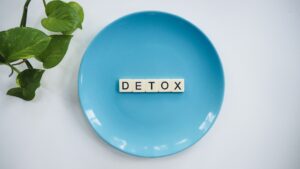Let’s Talk Detox: Demystifying Trends & Supporting Your Body’s Natural Detox Pathways
In the world of wellness, the word “detox” has become a buzzword, often associated with fad diets, juice cleanses, and quick fixes. But what does detoxification really mean? More importantly, how can we support our body’s natural detox pathways without falling into the trap of unsustainable trends?
Let’s break down the science behind detoxification and explore practical ways to assist your body in doing what it’s already designed to do—detox itself.
What is Detoxification?
Detoxification is the body’s natural process of eliminating toxins—substances that can potentially harm the body. Our body encounters toxins from external sources (environmental pollutants, pesticides, chemicals in processed foods) and internal sources (byproducts of normal metabolic processes).
Your liver, kidneys, lungs, digestive system, and skin are the primary organs responsible for detoxifying and eliminating these harmful substances. The liver plays the biggest role, processing toxins into less harmful compounds, which are then excreted through urine, feces, and sweat.
The idea of supporting detoxification isn’t new, but modern trends often market it as a quick solution to feeling sluggish or unwell, which is where the confusion begins.
Demystifying Detox Trends
In recent years, detox diets, teas, and cleanses have become wildly popular. They promise everything from rapid weight loss to increased energy levels, with claims that they can “flush out” toxins overnight. Unfortunately, many of these trends are not backed by science, and some can be harmful to your health.
Here are a few common detox myths:
- Juice Cleanses are Essential for Detoxification
Juice cleanses might seem like a shortcut to detox, but they often deprive your body of the essential nutrients it needs to function optimally. While juices are full of vitamins, they lack protein, healthy fats, and fiber, which are crucial for detoxification. - Detox Diets Can Speed Up Liver Function
Your liver doesn’t need a “reset” or “boost.” It’s constantly working to filter toxins. Instead of extreme diets, supporting liver health with nutrient-rich foods is far more beneficial. - Drinking Detox Teas Will Eliminate Toxins
Detox teas often contain diuretics or laxatives, which lead to fluid loss—not toxin removal. While they may cause temporary weight loss, this is primarily due to water loss and doesn’t equate to detoxifying your system. - You Need to Starve to Detox
Fasting or extreme calorie restriction may stress your body rather than help it. Adequate nutrition is vital to fueling detox pathways and supporting your organs in doing their job.
Supporting Your Body’s Natural Detox Pathways
The good news is that your body already knows how to detoxify. The goal is to support these processes through balanced, sustainable practices. Here are some practical and science-backed ways to enhance your body’s detox abilities:
- Hydration
Water is essential for detoxification. It helps the kidneys filter waste and supports the elimination of toxins through urine and sweat. Aim for at least 8 cups of water per day and increase your intake if you’re more active or live in a hot climate. - Eat a Balanced Diet
Focus on whole foods, especially fruits and vegetables rich in antioxidants, fiber, and phytonutrients that support liver function. Cruciferous vegetables (like broccoli, kale, and Brussels sprouts) are particularly effective at boosting the liver’s detoxification enzymes. - Increase Fiber Intake
Fiber helps bind toxins in the digestive tract and promotes regular bowel movements, which is critical for eliminating waste. Include whole grains, nuts, seeds, and legumes to ensure you’re getting enough fiber daily. - Prioritize Protein
Amino acids from protein are essential for the liver’s detoxification process. Make sure you include lean meats, fish, legumes, and nuts in your diet. - Exercise Regularly
Physical activity boosts circulation, encourages sweating, and helps lymphatic drainage—all of which support detoxification. Aim for at least 30 minutes of exercise most days of the week. - Sauna Therapy
Similar to regular exercise, sauna therapy can cause sweating which helps eliminate toxins like heavy metals (e.g., lead, mercury, cadmium), pollutants, and certain chemicals from the body through the skin. It also improves circulation, promotes lymphatic drainage, and enhances metabolism.
- Get Enough Sleep
Your body does a lot of its repair and detox work while you sleep. Aim for 7-9 hours of quality sleep to give your liver and other organs the time they need to effectively process and eliminate toxins. - Incorporate Gentle Detoxifiers
Certain natural compounds can support detoxification. For example, milk thistle has been shown to protect liver cells and improve liver function. Herbs like turmeric and dandelion root are also popular for supporting detox pathways. Before starting any supplements, it’s important to consult a healthcare provider, especially if you have underlying health conditions. - Reduce Exposure to Toxins
While we can’t avoid all toxins, we can minimize our exposure to them. Choose organic produce when possible, avoid processed foods, limit alcohol, minimize plastic exposure and consider using non-toxic cleaning and personal care products.
The Bottom Line
Detoxification is not about quick fixes or restrictive diets. It’s a continuous process that your body is naturally equipped to handle. The best way to “detox” is by supporting your body’s built-in detoxification systems through hydration, proper nutrition, regular exercise, and good sleep.
Rather than falling for trendy detox solutions, focus on long-term, sustainable lifestyle changes that empower your body to do what it does best: keep you healthy and toxin-free.
- Dr. Kristiana Engelhardt

